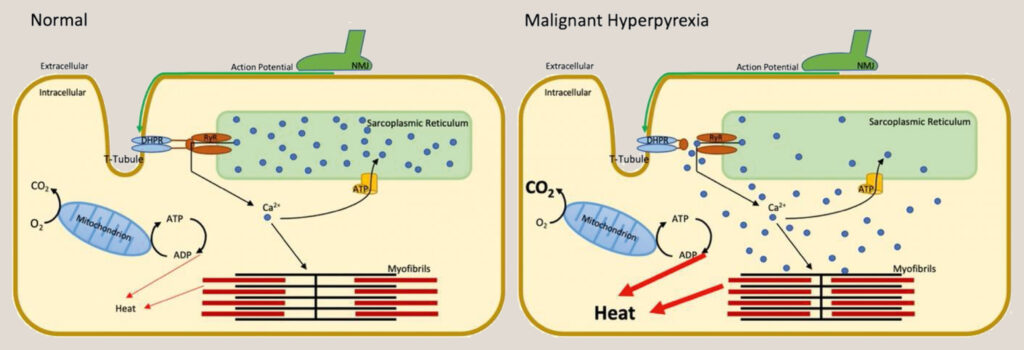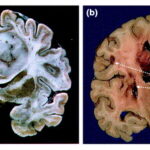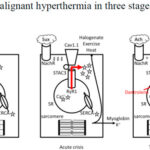Malignant hyperthermia (MH) is a rare but potentially fatal condition triggered by certain anesthetic agents and muscle relaxants. It is characterized by a rapid increase in body temperature, severe muscle contractions, and metabolic acidosis. Prompt recognition and treatment are essential to prevent serious complications or death.

Causes and Risk Factors
MH is primarily caused by genetic mutations that affect calcium regulation in skeletal muscle cells. The condition is most commonly linked to mutations in the RYR1 gene and, less frequently, the CACNA1S gene.
Triggers
- Volatile anesthetic agents: Halothane, isoflurane, sevoflurane, desflurane
- Depolarizing muscle relaxants: Succinylcholine
- Exertion and heat stress: Though rare, individuals with MH susceptibility may experience a reaction during intense exercise or exposure to extreme heat.
Genetic Predisposition
- Autosomal dominant inheritance: A single copy of the defective gene can result in MH susceptibility.
- Family history: Individuals with a family history of MH should undergo genetic screening and muscle contracture testing.
Signs and Symptoms
Symptoms of MH can appear within minutes of exposure to a triggering agent. The severity and onset vary, but common signs include:
- Rapid and extreme rise in body temperature (>104°F or 40°C)
- Muscle rigidity, especially in the jaw and upper body
- Tachycardia (rapid heart rate) and arrhythmias
- Profuse sweating and flushed skin
- Hypercapnia (elevated carbon dioxide levels)
- Metabolic and respiratory acidosis
- Dark brown urine (myoglobinuria)
- Multiple organ failure if untreated
Diagnosis of Malignant Hyperthermia
Early diagnosis is crucial to preventing severe complications. Key diagnostic methods include:
Clinical Diagnosis
- Sudden onset of symptoms after anesthesia administration
- Elevated end-tidal CO₂ levels despite ventilation adjustments
Laboratory Tests
- Arterial blood gas (ABG): Shows metabolic and respiratory acidosis
- Serum creatine kinase (CK): Elevated levels indicate muscle damage
- Serum potassium levels: Hyperkalemia due to muscle breakdown
Definitive Diagnostic Tests
- Caffeine-Halothane Contracture Test (CHCT): Performed on a muscle biopsy sample
- Genetic Testing: Identifies mutations in the RYR1 or CACNA1S genes
Treatment and Emergency Management
Immediate Steps
- Discontinue triggering agents immediately
- Administer 100% oxygen at a high flow rate
- Stop the surgical procedure if possible
Pharmacological Treatment
- Dantrolene sodium: The only specific antidote for MH; administered intravenously at 2.5 mg/kg and repeated as needed
- Sodium bicarbonate: Used to correct metabolic acidosis
- Diuretics and fluids: Prevent kidney damage from myoglobinuria
- Cooling measures: Ice packs, intravenous cold saline, and cooling blankets
Prevention Strategies
Preoperative Screening
- Family history assessment
- Genetic testing for high-risk individuals
- Muscle contracture testing in uncertain cases
Anesthesia Modifications
- Use non-triggering anesthetic agents: Propofol, etomidate, and regional anesthesia
- Avoid succinylcholine and volatile anesthetics
- Ensure availability of dantrolene in all operating rooms
Long-Term Outlook and Prognosis
With prompt diagnosis and treatment, the survival rate for MH is high. However, patients who have experienced an MH crisis must take lifelong precautions.
- Genetic counseling is recommended for affected individuals and their families.
- Medical alert bracelets should be worn to inform healthcare providers of MH susceptibility.
- Regular follow-ups with anesthesiologists and genetic specialists are essential.
Malignant hyperthermia is a life-threatening medical emergency that requires immediate intervention. By understanding the risk factors, symptoms, and treatment options, healthcare professionals and patients can minimize the risk of complications. Genetic testing and preventive strategies play a crucial role in reducing the incidence of MH-related fatalities.

